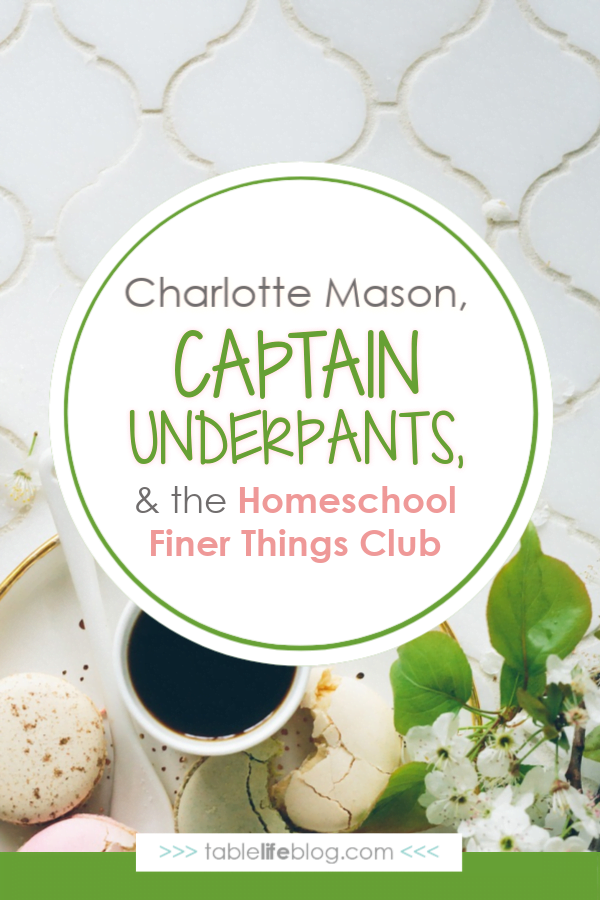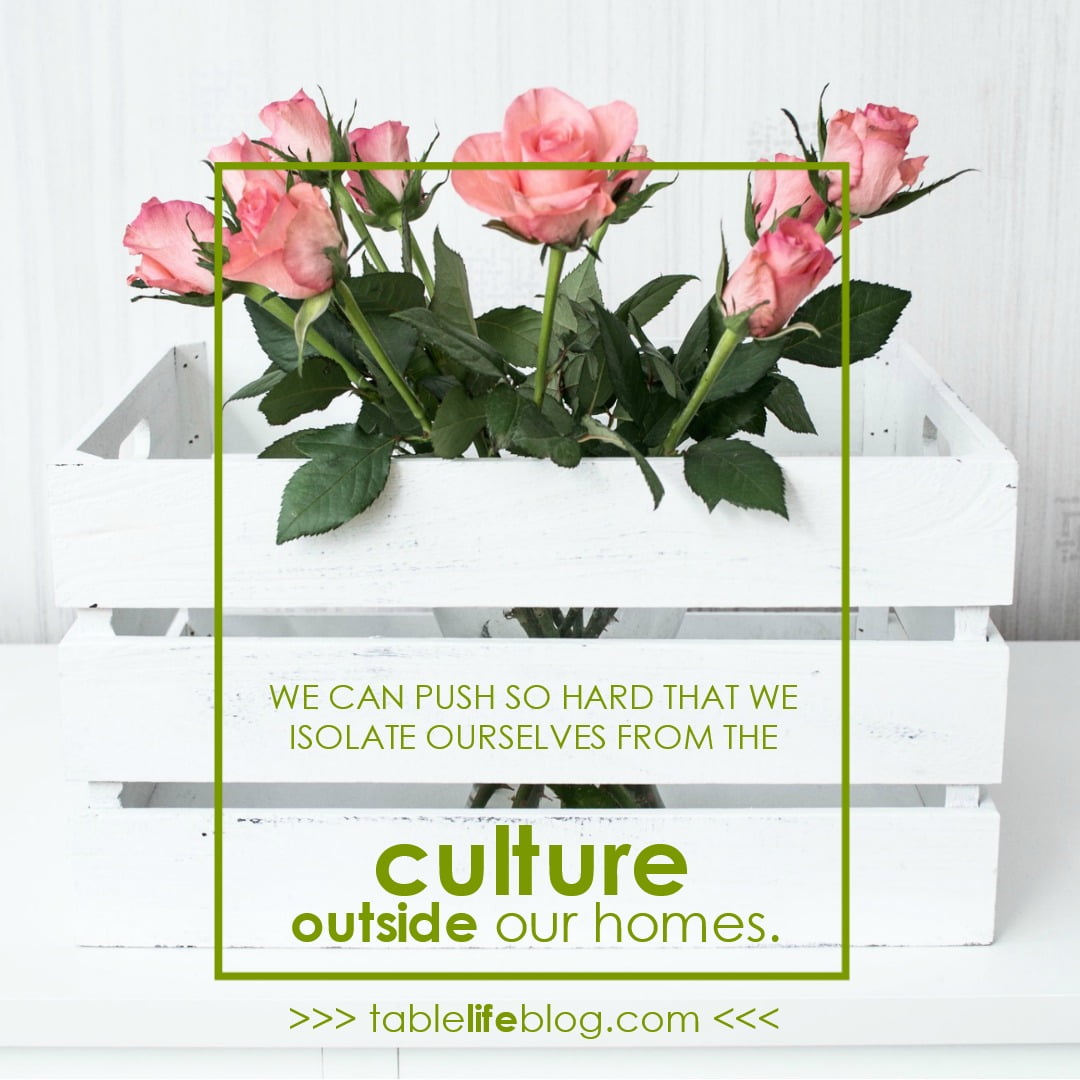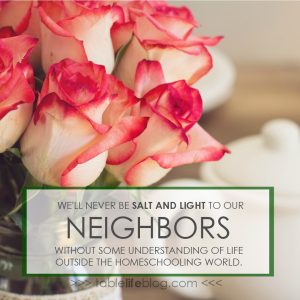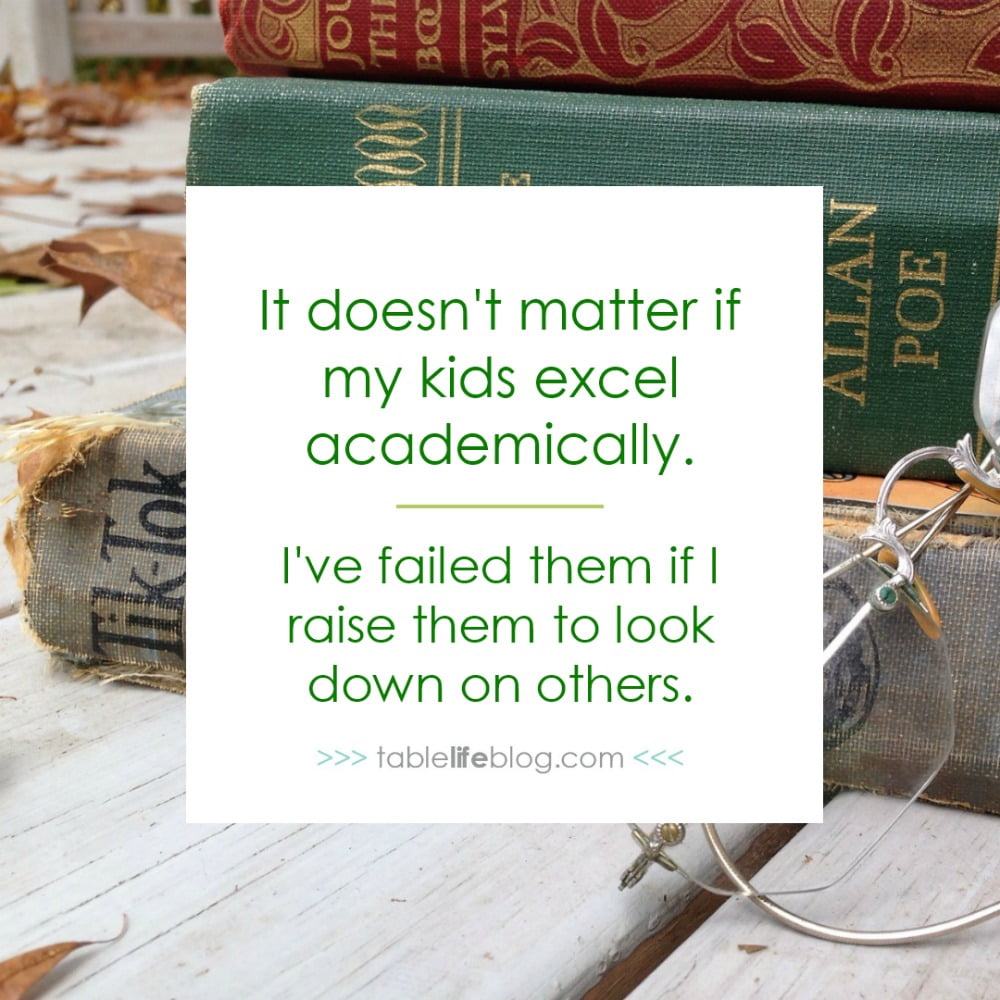The opportunity to provide a carefully curated learning environment is a blessing of the homeschool life. It requires leading by example, intentional living, and discipline from parents, but it’s a beautiful thing to be able to build our homeschools and our homes around the honorable, the right, the pure, and the lovely.
It’s a gift, for sure, but it can also be our demise.


*Post contains referral links; see disclosure for more information.
We don’t have a fully Charlotte Mason homeschool happening under our roof, but we are among the families who draw inspiration from her thoughts on education and parenting. One of those has been the concept of exposing our children to only “the good, the excellent, and the great” as Susan Schaeffer Macaulay writes in For the Children’s Sake. She goes on to explain the core of Ms. Mason’s educational method in When Children Love to Learn:
“Charlotte Mason’s education ideal was not to remove us from the ordinary but to enrich us, each one, with the best possible relationships — relationships with God, with people in our family and community, with others through their books, art, or music, and with God’s creation.”
Susan Schaeffer Macaulay
I don’t know about you, but I count myself privileged and blessed to have the opportunity to shape not just our homeschool, but our family culture around above notion.
It’s a refreshing concept if you frequently find yourself perusing the aisles of your local Books-A-Million. Don’t get me wrong. There are some excellent reading choices there. It’s just that you have to pass through toys, Captain Underpants displays, and endless twaddle to find them.
That said, no one had to strong-arm me into shifting to a Charlotte Mason-driven homeschool over the years. I understand why her principles matter and seen many fruits from shaping my kids’ education in this way.
But here’s the thing: all the fruit hasn’t been sweet. We’ve let some bitter fruit sneak in along the way. Before I get to that, I do want to mention that the issue here isn’t with the Charlotte Mason method at all. Instead, the problem stems from the us versus them mentality that’s developed in Charlotte Mason circles over time. I’m not suggesting that this is a blanket problem, but it’s one that exists nonetheless.
The Finer Things Club
There’s an interesting subplot in the “Branch Wars” episode from season four of The Office. While Michael, Dwight, and Jim are busy pranking Karen Filippelli at Dunder Mifflin’s Utica branch, Pam, Toby, and Oscar try unsuccessfully to hold their Finer Things Club meeting back in Scranton.
In the episode, Pam explains that the club meets “once a month to discuss books and art, celebrate culture in a very civilized way … there is no paper, no plastic, and no work talk allowed. It’s very exclusive.“
Despite the efforts to create an atmosphere that celebrates art and literature, their less-cultured coworkers cause a slew of distractions and interruptions while this exclusive club meets.
I sympathize with Pam, Toby, and Oscar. I never sat in that break room with them while coworkers were banging on vending machines or struggling with the microwave, but I understand the desire to bring culture into the day-to-day.
But what about Jim? What about Andy? Both obviously want to be included, but both know they’re not welcome. Andy never scores an invitation, but when Jim finally gets a pity invite from Pam, he makes the terrible mistake of referring to Angela’s Ashes as “a fun read” and demonstrates why he should’ve never been allowed to attend.
Charlotte Mason, Captain Underpants, and the Homeschool Finer Things Club
There’s nothing wrong with the Finer Things Club. In fact, it’s wonderful to create a cultured atmosphere that promotes finer things in our homeschools and our homes in general. What a gift to our children!
The Dangers of Finer Things
You don’t have to be a Charlotte Mason homeschooler to say that her educational philosophies have inspired you somewhere along your homeschool journey. You don’t even have to be a Charlotte Mason homeschooler to say that her principles have shaped your journey.
Ms. Mason’s principles are well known and practiced by countless homeschool families and classroom educators around the world. Unfortunately, somewhere along the way, we’ve allowed these guidelines to become legalistic and condescending.
What’s worse is that we’ve used these educational guidelines as excuses to place ourselves on our homeschool high horses and look down on those outside our carefully controlled circles.
I fully admit that I work hard to create an atmosphere in our home that embraces culture, the arts, and all the finer things. However, I know that if we’re not careful, we can create our very own Homeschool Finer Things Club. I’ve learned this the hard way and can say from my own convictions that it’s not who we’re called to be as Christ followers.
Isolated and Insulated
The problem with a Finer Things Club mentality is that we isolate ourselves and exclude others who don’t operate within the standards we choose for ourselves.
I’m all for embracing Charlotte Mason concepts like education being an atmosphere, a discipline, and a life, but if we’re not careful we can push so hard to focus on the climate in our homeschools that we lose touch with the culture our neighbors embrace.


I understand that it’s tempting to be isolated and voluntarily insulated in a world where twaddle and straight up filth often come in the same package. Even so, being oblivious to the outside world doesn’t help anyone.
I was recently confronted with my own issues in this area. My big kid moved from children’s ministry to student ministry at church over the summer and I chaperoned his first youth group trip. It was an eye opener for me because it showed me just how wide the gap is between the culture in our home and the culture outside.
We returned from that trip and my pastor husband pointed out that I need to be intentional about making time personally for listening to songs from the Top 40 chart and keeping up with pop culture. He noted that I needed to work on being able to have a conversation that didn’t involve homeschooling, church, or parenting. Ouch.
In case you’re wondering, I know two songs on the current Top 40 chart and I just finished rewatching Downton Abbey again. I’m taking baby steps in all of this.
Pride and Prejudice
If we’re not careful, we can develop a sense of pride if we spend too much time in the Finer Things Club. You see, it’s easy to get a little puffed up when your five year-old asks for more Shakespeare or your 9 year-old explains why we really celebrate St. Patrick’s Day to the public school children at church.
We get puffed up because we see this fruit and it looks fantastic in comparison to the other fruit that’s available. Why on earth wouldn’t we focus on the finer things? Wouldn’t we be doing ourselves and our kids a disservice by allowing them to be influenced by the non-homeschool culture?
I mean, even the Apostle Paul gives us a green light on the Finer Things Club, right?
And now, dear brothers and sisters, one final thing. Fix your thoughts on what is true, and honorable, and right, and pure, and lovely, and admirable. Think about things that are excellent and worthy of praise. – Philippians 4:8


Here’s the thing, there’s a fine line between focusing on what’s pure and lovely and giving ourselves permission to disregard those who don’t follow these convictions. Remember, we’re not supposed to conform to this world, but instead be salt and light to those around us.
We have a pride problem when we justify our choices by comparing our kids and our methods to those who choose a different path. We can’t be salt and light to a world we think less of and make no attempt to understand. We also can’t let our chosen educational methods determine our willingness to carry out the great commission.
Condescension and Condemnation
If we’re not careful, we’ll look down on others. Think I’m wrong about this one? Share that your kids love reading Magic Tree House, Diary of a Wimpy Kid, and Captain Underpants books in a Charlotte Mason (or even Classical) Facebook group and get back to me.
What’s more is that I’ve heard homeschooled children interact with other kids about their reading selections, and sound incredibly snobbish. That’s because of this “my books are better than your books” mindset.
Kid 1: Have you read the latest Captain Underpants book?
Kid 2: No, we read *real* books.
Kid 1: The Captain Underpants movie is in the theater now. We’re going Saturday morning if you want to come too.
Kid 2: There’s no way I’m seeing that movie.
I’ve heard those conversations and they’re not pretty. It’s great that Kid 2 isn’t interested in those books, but there’s a better way to deliver the message.


I don’t care how my kids excel because of our homeschool life, I’ve failed them if I raise them to look down on other children because of a crude movie or book series. That doesn’t mean they need to subject themselves to something they won’t enjoy for whatever the reason, but an uppity response is never the way to go.
In closing, we’re working hard to balance homeschooling with Ms. Mason’s principles in mind and yet enjoy community with those who don’t. It’s not always easy to navigate, but I’m happy we’re making progress and venturing away from the Finer Things Club a bit.

I have been charlotte mason homeschooling a lot of years now. I have decided that Captain Underpants is okay for just fun. Twaddle cannot be defined by anyone but me for my family. “Good” read a louds are great. Stories of kids being parentless, scared etc…upset my child. The world is harsh enough. We read about heroes, valor etc…..but it is okay to have silly fun as well. Great article.
“It’s great that Kid 2 isn’t interested in those books, but there’s a better way to deliver the message.”
So what is the right way to deliver that message while still believing X isn’t a good thing? I worry that the pendulum will swing the other direction and become pitying and condescending. No one wants to be pitied either.
Keep in mind tone makes a huge difference, but the first ideas that come to mind are encouraging them to say something like, “I heard about that, but I usually like reading books like XYZ.” or “I might check into that.” Either of those would acknowledge the remarks without really getting into the reasons one might choose not to make those choices.
If you have suggestions I’d love to hear them! :)
Oh I am so glad this is being talked about! I recently left a facebook group for the “early years” followers of Charlotte Manson. I got so tired of the arguments of what’s twaddle and what isn’t twaddle or what is in the category of a “living book” or not. It seemed like the constant battle of who’s more right and therefore raising their child in a superior way. To quote Proverbs 3:5-7 “Trust in the LORD with all your heart, and do not lean on your own understanding. In all your ways acknowledge him, and he will make straight your paths. Be not wise in your own eyes; fear the LORD, and turn away from evil.” If you are looking down at others you are doing it wrong!! I’m middle of the road here and *gasp!* let my kids read graphic novels. You have to be very very careful with graphic novels, I read through them before they come home with us. But, I would rather that than them sneaking them when they are older. I enjoy them too.. we are all very visual.. and enjoy the art of them — that’s probably another picking bone calling graphic novels “art.” Haha! Thank you for your post!
This was very thought-provoking. Thanks for writing it!
Is that Captain Underpants book from the UK? It sounds like our sense of humour!
Thanks for this convicting article. I don’t know how many people will be ready to receive it, but thank you for the warning. It is easy to feel proud and superior, rather than enriched, by the educational atmosphere of the “home school”.
Them again, my 10 year old didn’t have behavior issues until after he started reading the Diary of a Wimpy Kid series. It became very apparent to me that they contributed to his poor behavior while I was watching the latest movie with him and realized he acts EXACTLY like the main character. The books and movies have now been banned in our house.
As a now veteran homeschooler of a 20 year old and a 19 year old and finishing up with a 16 year old I can say that I did protect my young children from books like Captain Underpants and read “good” books instead. However, this past summer I took my now 20 year old son and my 16 year old son to see the Captain Underpants movie and I was surprised at how much I enjoyed it. It really showcased a lot of why we homeschool because of the individual creativity that gets lost in traditional school settings trying to have everyone behave in a way that someone (administration) has defined as acceptable. How can we celebrate the unique way God created each of us while trying to get everyone to be the same? It was really a cute movie but then again my kids are adults so we could talk about the deeper things in the movie and they know not to keep repeating the “potty” humor at their age now. There is an appropriate maturity level for some material. Be in the world but not of it. It’s good to hear that you are being intentional to raise kind and compassionate people not just Uber intellectuals!
So do you encourage your children to be exposed to less pure, wholesome things or just allow it as it comes? I have a hard time feeling most of these things are appropriate as my children will pickup the exact things I am trying to avoid.
The big issue for me is that I’ve had to make changes in my own awareness of what else is out there. As my kids enter new seasons, I can’t guide them to make good choices if I don’t even know what’s out there. Also, I’m a pastor’s wife and I feel like I’ve been unable to connect with parents outside of the homeschooling world for several years now. That’s not to say that I’m changing who I am, but I am trying to have a better understanding of what influences the families who choose differently.
As for what my kids are exposed to, we’re still mindful of what they watch, read, and hear and we’re fine with saying “no” when we feel the need. In fact, we talked last night about a show we’re no longer allowing and explained why it’s no longer welcome. Both were glad to hear the explanation and didn’t want to watch once they understood our reasoning. So, I’m definitely not advocating unlimited exposure to anything, but just more grace for those who don’t share our convictions.
Wow, that was very convicting. :( I have been guilty of this, and I know I need to change. Thank you for writing this.
There is a guy named James harleman who has a book and a Blog called cinemagogue, and he talks about how knowing the stories that people are telling to one another (in his case, movies) enables us as Christians to add context, metaphors, or references that they can relate to. It’s sort of the same idea as Eternity In Their Hearts. BUY not only that, but it allows us to discuss the truths – and the lies – in those stories; the hidden assumptions and the disguised longings and questions.
I found a discussion of the recent Wonder Woman movie to be a good opportunity for discussion about how God loves us because he is loving, not because we are deserving. (as WW chooses to save those not worthy). Orson Scott Card wrote an essay about why we tell stories: to define how we see the world, what group we belong to, and what we value and see as true. We can tell grand Bible stories that set up underlying values, history stories that explain where we fit in our world, and we can tell petty stories about what happened at the grocery store to reinforce our idea of what’s appropriate behavior in our society. If we know the stories that other people are telling, we are able to meet them in the place where they exist, maybe not speaking the same language but at least being able to interpret it.
Anyway your post seems to say some of this too, but i recommend Eternity in their Hearts and cinemagogue, the latter as a way to learn some of those stories or get some godly insight without necessarily having to watch the movies.
I love this, Emily! It is so beautifully and gracefully said. This kind of condescension does not benefit the Kingdom at all.
Excellent thoughts, Emily! (Would you believe my youngest is devouring the fourth book in the Diary of a Wimpy Kid series as I type this? Lol)